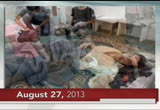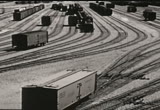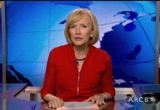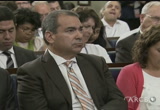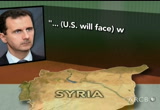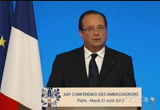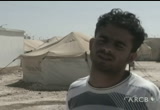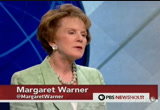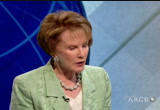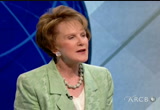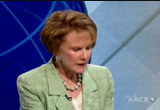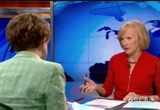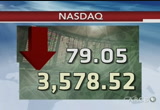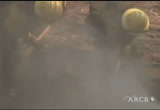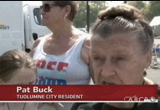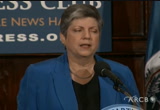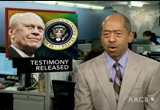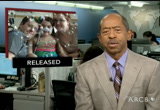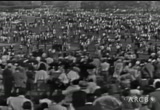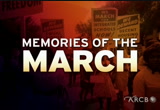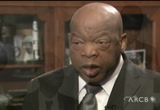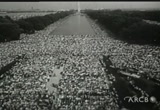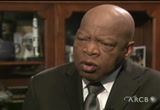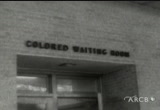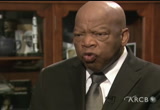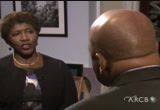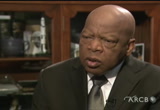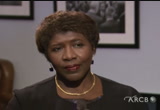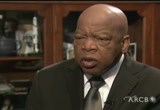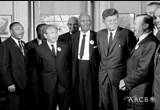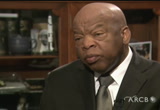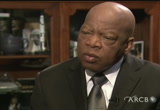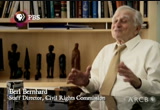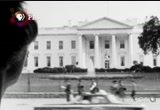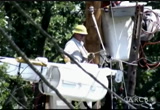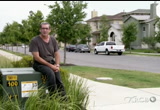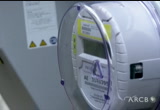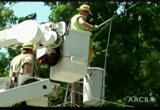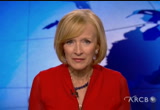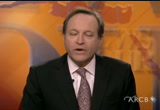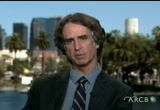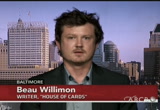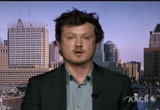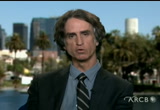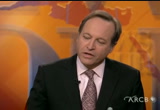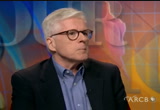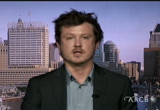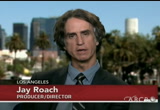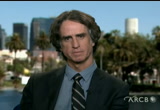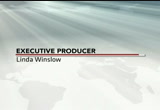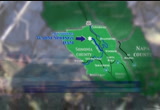tv PBS News Hour PBS August 27, 2013 5:30pm-6:31pm PDT
5:30 pm
>> the u.s. military is ready to go if the president orders a strike on syria. good evening i'm judy woodruff. >> i'm gwen ifill. and the newshour tonight as the obama administration gathers international support for military action, it says the goal of any response will not be regime change. margaret warner has the latest on options for action in syria. then we return to the march on washington 50 years on. tonight reflections from the
5:31 pm
last living speaker, georgia congressman john liu business. >> it was all inclusive it was black and white, latino, asia asian-american and native american. >> they came from idaho, wyoming, and they were there. carrying their signs. >> and we conclude our series on governing in a time of gridlock with a look at how the entertainment world sees the nation's capital. >> the question we ask is if someone is actually getting something done, do the ends justify the means? it is an interesting question to ask when washington is paralyzed by gridlock. >> that is all ahead on tonight's newshour. >> major funding for the pbs newshour has been provided by...
5:32 pm
moving our economy for 160 years, bnsf the engine that connects us. >> and the hewlett foundation working to solve social and environmental problems at home and around the world. and with the ongoing support of these institutions and foundations. and this program was made possible by the corporation for public broadcasting. and by contributions to your pbs station from viewers like you. thank you. >> the on to the world we are focused on washington and western capitals today amid rising expectations in an attack on syria is coming soon. the obama administration
5:33 pm
insisted again there is no doubt the assad regime used chemical weapons last week in a damascus suburb. inside the white house, the emphasis was on laying the legal ground work for a possible military strike in syria. spokesman jay carney pointed out that nearly 190 nations have signed a convention opposing the use of chemical weapons. >> there must be a response. kerry made that clear at the president's instruction and i'm echoing it again today. we cannot allow this kind of violation of an international norm with all the attendant grave consequences that it represents to go unanswered. what form that response will take is what the president is assessing now with his team. >> whatever form it takes carney was quick to say the goal will be limited. >> i want to make clear, that the options that we are considering are not about regime
5:34 pm
change. they are about responding to a clear violation of an international standard that prohibits the use of chemical weapons. >> as president obama pondered his options, defense secretary hagel visiting bruny told the bbc, the u.s. military is set once a decision is made. >> allies are partners, leaders all over the world have said let's get the facts. let's get the intelligence. and then a decision will be made on whether action should be taken if action should be taken, what action or no action. but if you were to come you are ready to go like that? >> we are ready to go like that. syrian president bashar al-assad remained defiant. he told a state run news agency if the u.s. strike it is will face what it has been confronted with in every war since vietnam, failure. echoing that assad's deputy foreign minister said his
5:35 pm
country would respond swiftly if attacked. >> we know how to defend ourselves. but the americans and the british and the french havep failed in afghanistan and iraq and other places, they will fail in syria and there will be a high price not only for them, but for international peace and security. >> in britain there was a flurry of activity in and out of 10 downing street as prime minister cameron called parliament into session this thursday to consider action. >> let me stress to people this is not about getting involved in a middle eastern war or changing our starts in syria or going further into that conflict. it's nothing to do about that. it's about chemical weapons and the use is wrong and the$# should not stand by. >> in paris, the president said his country favors action as well. >> the chemical massacre in damascus cannot be left without a response and france is ready
5:36 pm
to take a response. >> the arab legals"ñ/ an emergency meeting in cairo. it acaused syria of using chemical weapons without directly endorsing the use of force by western powers. >> i condemn the atck and call upon the international inspectors from the united nations present in damascus to go to the area of the attack to find the truth behind the crimes. it is an international vie laftion human rights and the ones who committed the crime must be dealt with according to the international justice system. >> reporter: but it is syrian refugee camp in jordan many forced to flee their homeland said the rest can not act soon enough. >> we totally support an american military strike against bashar al-assad. we hope the syrian people hope that a military operation will start soon. what are they waiting for? >> we support such a decision because countries have not supported us. the arab and western countries have failed us and let us down.
5:37 pm
but if they decide to interfere against bashar al-assad's regime, god bless them. >> u.n. inspectors remained at a damascus hotel. a potential complication for western military planners. the team posñ site of the alleged gas attack today citing security concerns. margaret warner has been covering today's developments on this story and she joins me now. before we begin we should tell our audience that the newshour will have an interview with president obama on tomorrow's program. so what are you hearing behind the sceneszçz will wait to make a decision until the u.n. inspectors finish their work? >> no, judy he will not that is what i am told. as one white house official said they are not hostage to the timetable of the u.n. inspectors especially if it appears the regime is trying to delay them. that said, and it's unclear when the inspectors will be done
5:38 pm
though i'm told by the u.n. once they have concluded their report about what happened last week, they will issue that before they go on to other sites they were to look at. however, what the u.n. inspectors find is important to the administration in terms of building an international case. because they are looking not only at whether cw was used but what type, how widespread and potentially the delivery vehicles that if they want to build a narrative. so if you can determine what kind of weapons were used and say fragments of rockets for example that only the assad regime has that helps build an international case. >> what has been going on behind the scenes? >> you know, judy in the public statements they did not advance the ball at all. behind the scenes i'm told what they are debating is what course of action militarily needs to defined objectives and limited objectives not to get involved in the civil war as we have heard everyone say but to punish
5:39 pm
also deter and prevent the assad regime from using chemical weapons again. now, that sounds easy, but as it's described it's not so easy. if you are going to prevent future use of chemical weapons that means attacking some of the military assets involved in this. is it command and control? is it the units that delivered them? is it the kind of delivery sites rocket sites that were involved? that naturally will degrade assad's ability on the battlefield. so it's trying to walk that fine line. and to that end, they are consulting with allies, military and political allies and also on the hill. >> a lot of consulting. do they have a point? >> well, i think these are straws in the wind but jay carney said the timetable for the president to issue the white house to issue the u.s. intelligence assessment is by the end of the week. and a diplomat in one of
5:40 pm
america's allies countries said their understanding it would come in the next day or two and before british prime minister cameron has his special meeting of the parliament on thursday, where they will debate this. >> so they are paying attention to what the british parliament does? >> oh, yes. but you can see this isñf one-two step. you have haig, the british secretary comes on the "today" show and hagel on the bbc. they are working in tandem. >> and we know there is a rising crescendo of members of congress saying it's not enough for the president to consult with congress he needs congressional authorization. >> well, from what i hear, there are not many call for authorization. speaker boehner did not say that. senator talked about appropriate consultation there is one congressman from virginia a republican who talked about authorization. but what they have been doing is stepping up their calls i'm told
5:41 pm
senator kerry talked to the senate foreign relations chairmanqfwt mendez and levin hd of the services committee though i'm told that congressman rodgers has received only a sketchy briefing not really a full phone call not from a senior member of the administration like senator kerley and owes does not feel he has been consulted. >> so the consultations are ongoing. >> i think they are ongoing. margaret, tell us a little bit more about what4' are saying. if there is u.s. action, which allies will be onboard? who won't? what about the arab nations? >> judy if you start with the premise which i think the administration is, that a u.n. resolution authorizing this is unlikely. 10 they have to build an international coalition. which the way they did going into kosovo years ago. they are counting on the british
5:42 pm
and french we can hear the leaders say that today. the question is: can they get some regional actors involved? the arab league as you pointed out, said this was reprehensible and assad did it but did not endorse military action. the gulf states are behind this. neighbor turkey is behind this. probably will be part of a coalition as a nato member. but there are other states in the region who are nervous for example, egypt no love lost with assad with the egyptian military regime but said it is a sensitive subject for us with our public. so the case has to be made internationally which is why the u.n. inspection report is important. israel, of course, is getting ready for retaliation because they have done everything from the syrians or hezbollah. i mean i don't know that it will happen but they are prepared so they have upgraded gas masks. >> and quickly no waiting for
5:43 pm
the u.n. to discuss this and debate? >> no. what i do not know and i don't know if it's unclear, undecided or not known to us is whether the administration will feel it needs to make at least the effort, go to the u.n., propose a resolution, get voted down and then act. >> margaret warner great reporting once again. thank you. >> thanks. still to come on the newshour, john liu business reflects on the march on wash wab and how political paralysis plays out in entertainment. first with the other news of the day here is kwame holman. >> talk of u.s. military strikes on syria rattled wall street. stocks sank on fears of unstability in the middle east. the dow jones lost 170 points to close at 14776, the nasdaq fell 79 points to close at 3578. in addition, the price of oil in new york topped $109. the highest in a year-and-a-half.
5:44 pm
firefighters in california claimed advances today against the huge fire nearhea yosemite national park. it's 20% contained. the battle against the expanding blaze entered its 11th day as fire crews worked to grow the containment lines around more of the perimeter. with that progress, the enormous wildfire burned more of the stanislaus national forest spreading to 280 square miles. >> it's not growing like it did in the earlier days. but it is still active. it's still:b0 moving. it's still giving them fits. >> nasa's satellite images showed smoke plumes reaching for miles. officials hoped the forecast cooler temperatures and higher humidity starting tomorrow will allow crews to get the upper hand. >> we are starting to get a handle on this. it's been a tiger. it's been trying to bite its own tail and it will not let go.
5:45 pm
but we'll get there. >> the wildfire has expanded eastward in recent days moving deeperoe park's backcountry but most of the park remains open and unaffected. flames also have come within a half mile of the reservoir with supplies 85% of san francisco's drinking water. but officials today were more confident the fire would not disrupt hydro electricity made by the reservoir's dam and the danger of ash tainting the water supply was avoided by a new gravity-operateed pipeline that moved water to holding basins closer to the city. elsewhere, the fire has consumed stands of thick oak and pine as it closes in on the city west of yosemite. >> going up and down the canyons we don't know where it's coming up and we don't know from day-to-day which community is threatened. so little spooky. >> the rim fire now is the
5:46 pm
largest on record in california's sierra nevada mountains. investigators are trying to determine how it started. the u.s. secretary of homeland security said her agency is better prepared to respond to natural disasters and to terrorism. janet napolitano gave her farewell speech today and touted the don't handling of hurricane sandy, the gulf oil spill and the boston marathon bombing. >> each of these challenges tested us in new ways. they presented new opportunities for us to learn, grow and get better at what we do as a department and as a nation. i'm proud of our accomplishments and the men and women across dhs that made them possible. i'm proud of how far we've come over the past four-and-a-half years. and i'm proud to have played a role in guiding the department to a more mature and stable state of operations. >> janet napolitano departs washington next week. she is leaving to become president of the university of
5:47 pm
california system. a former j.p. morgan-chase trader was arrested in spain today for allegedly covering up $6 billion in losses. javier martin-artajo turned himself into police in madrid and said he will fight any attempt to extradite him. he and another trader face u.s. criminal charges of falsifying bank records. both men have denied wrongdoing. for the first time, the public can see then president gerald ford describe an attempt on his life. it happened in sacramento, california in september,%th 197. two months later, mr. ford%fr would be assassin, lynette "squeaky" fromme, a follower of charles manson. yesterday, a federal court released the videotaped deposition and the sacramento bee newspaper posted it on-line. in it the president calmly tells how fromme tried and failed to shoot him. >> the weapon was large, covered all or most of her hand as far
5:48 pm
as i could see. and i only saw it intaniously because almost automatically one of the secret service agents lunged, grabbed the hand and the weapon and then i was pushed off by the secret service detail. >> fromme was convictedsf releaseed from federal prison in 2009. mr. ford passed away in 2006. his testimony was made public at the request of a sacramento historical group. a philadelphia hospital today released sarah murnaghan, the child who sparked a national debate about the organ transplant system. she suffers from cystic fibrosis and was at the bottom of the priority list for a new adult lungs because of her age until a federal judge intervened. today she arrived home. her parents said they hope their story serves as an example for others.
5:49 pm
>> you can really make change and if you really the most important thing is always advocate for the child. always. and if there are things that you don't think you can accomplish, they can. they can. and people will come behind you and support you to do that. >> yes, there are more amazing people out there/o than -- >> than you can imagine. e 11-year-old child had been hospitalized since february. she received her new lungs over the summer. those are some of the day's major stories. >> next we turn to a series of conversations about the 50th anniversary of the march onç:ge washington. leone dukes from upstate new york was a student at virginia's hampton university in 1963. >> these are major, 200,000 plus people just in unity and harmony and listening to the people doing the speeches and singing. it was just awesome.
5:50 pm
we talked about it. everyone was coming back on the bus. we were singing and laughing and talking about the future and talking about things will change you know. and people say one day we will have a president who is going to be african-american and people were just foretelling the future because of their excitement that took place. it was scattered and left, you could feel the vibration that america now is getting used to the changes. you know what? something was going to happen and something good was going to happen. we didn't know when and how but something was going to happen. >> that was leone dukes from latham new yorkment can you find his story recorded for the web series memories of the march produced by public television stations around the country on the pbs website, black culture connection.
5:51 pm
john lewis was the youngest to address the crowd that day. he remembers the experience like it happened yesterday. his capitol hill office is a living museum, the walls covered with photographs and memorabilia from the civil rights era. we talked about his experience as one of the so-called big six leaders in the movement. congressman, thank you for joining us. i want to take you back 50 years to the day the march on washington. you were 23 years old. and you are now the last, living speaker from that day. what was that day like?e=u werr herossism on at that time day, i was blessed. i felt like i was tracked down by some force or spirit. i will never forget said i'm not -- i now present to you young john lewis, the student
5:52 pm
coordinating committee. and i went to the podium, and i looked to my right and i saw many, many young people, staffers from the student coordinating committee, volunteers. then i looked to my left, and i saw young people up in the trees, trying to get a better view of the podium. then i looked straight ahead. and i saw so many people with their feet in the water trying to cool off. and then i said to myself this is it and i went for it. >> you were standing on that stop if you go to the lincoln memorial today there is a disk that shows where speechers were given looking down the mall to the capitol. and that was a moment in time. what led up to that that brought the drama. your speech was not universally embraced what you pl+"ed to say that day. >> all over the american south,
5:53 pm
there had been hundreds and thousands of arrests. people had been beaten. jailed. some people had died in the struggle. we had met with president kennedy six of us, the big six. >> who were the big six. randolph he was the dean of the group. and the leader of the man, the man. he was so gifted. so smart, labor leader. spokesperson for civil rights had all the nice brotherhood. born in jacksonville, florida, moved to new york. and then you had whitney young of the national urban league. who was born in kentucky and later became a social worker and handled the school at atlanta university and a beautiful human
5:54 pm
being. and james farmer, who had attended college in texas and howard university. worked with the n.a.a.c.p. and later became the head of corps the congress racial equality. and roy wilkins head of the n.a.a.c.p. grew up in minnesota. he was a warrior he was a fighter. and then young martin luther king, jr.. born in georgia, man that i admired, i loved. he was my inspiration. >> and then you? myself. the youngster. i was young. i was really young. so i grewvc:÷ up very poor in rl alabama and growing up, i saw the signs that said white men, colored men, white women, colored women. and i come and ask my mother and my father and my grandparents why? and they said that is the way it
5:55 pm
is. don't get in the way. don't get in trouble. i was 15 years old in 1955. i heard of rosa parks. i heard the words of martin luther king, jr. on the radio. the action of rosa parks and the words and leadership of dr. king inspired me. i was deeply inspired and i wanted to do something. i wanted to bring down the signs. >> john f. kennedy was not a fan of thicd march originally. >> he did not like the idea of a march on washington. when met with him, randolph spoke up in his baritone voice we met with the president he said mr. president, the black march remembers wrestless and we are going to march on washington. and you could tell by the movement of president kennedy he started moving and twisting in his chair. and he said in effect, that if you bring all these people to washington, wouldn't it be chaos
5:56 pm
and disorder? and randolph responded he said mr. president, there's peaceful, no violent protests and president kennedy said i think we are going to have problems. so we left that meeting with president kennedy and came out on the lawn at the white house and spoke to the media and said we had a meeting with the president of the united states. and we told him we were going to march on washington. and a few days later, july 2, 1963, the six of us met in new york city at the roosevelt hotel. and in that meeting, we made a decision to invite four major white religious and labor leaders to join us in issuing?; washington. >> that is why when you look at the pictures of march now it's remarkable how diverse it was, how many white faces and black faces there were mixed in. >> the march was a march for all
5:57 pm
of america. it was all inclusive. it was black, and white, latino, asian-american, and native-american. it represented the best of america. people came from all over the place. you saw hundreds and thousands of religious leaders and church people. protestant, catholic, jewish. they came from places like idaho, wyoming. all over they were8 carrying their signs. >> when you gave your speech that day, you were considered to be a radical. everybody remembers the i have a dream speech as being this uplifting speech about togetherness and brotherhood but yours was tougher. >> i felt that we had to be tough. i had to deliver a speech that reflected the feelings and the views of the young people.
5:58 pm
and also the views and feelings of the people that was struggling in the black belt of alabama in southwest, georgia, in the delta of mississippi. >> and there was a line about marching through the south like sherman which had to be exercised before you delivered, isn't that right? >> it is true that i did have a line in the speech that said in effect if we do not see meaningful progress here today, the day will come, when we will not confine our marching in washington. but we may be forced to march through the south the way sherman did nonviolently. the archbishop of washington -- if i did not delete that part of the speech. and we had some discussion the evening before the march.
5:59 pm
and later someone came to me and said how is your speech and i said, we have to make some changes you have to delete something. and i remember having a discussion with mr. wilkins and i said roy, this is my speech. and i'm speaking for the young people. speaking people fresh from jails. and he sort of dropped it. and randolph and martin luther king, jr. came to me. and we met right on the side of mr. lincoln. the music was already playing. someone had a portable;÷ñ÷ typewriter. and dr. king said to me, john that doesn't sound like you. and mr. randolph said, john we've come this far together let's stay together.
6:00 pm
i could not say no to randolph or martin luther king, jr.. mr. randolph had been dreaming of a march on washington since the days of roosevelt and the days of truman. so we made the changes. and i deleted all the reference to sherman. and sort of suggested thateñ we would be forced to march through cities, including cities in the north as well as the south. >> so after the speech was over, you went back to the white house and this time the president was happier? >> after dr. king had delivered his i have a dream speech, president kennedy invited us back to the white house. he was stand in the oval office. he was just smiling almost grinning. he was so pleased he was so up, it was almost like a father proud of his children. and he stood in the door and he greeted each one of us.
6:01 pm
you you did a good job, you did a good job. and when he got to dr. king he said you had a dream. >> as people celebrate the 50th anniversary in the wake of supreme court ruling on voting rights and the wake of the turmoil this summer over the george simmer man trayvon martin case, should people be feeling not just black people but all americans feel optimistic or a little bit depressed about the state of race relations right now? >> i think all of america should be hopeful and try to be optimistic. but the american people, people believe in justice, believe in fairness, believe in equality should be concerned. the decision of the supreme court was a major setback. i truly believe that the supreme court put a dagger through the heart and soul of the voter
6:02 pm
ranks of 1965. the decision in the zimmerman case reminded me when i was very young when teal was lynched august 28, 1955. i was 15 years old. i was in a cornfield working and we heard about what happened. brought about a lot of pain and hurt and i think what we have in america today, pain and hurt. how can something like this happen? how can the supreme court do what it did?g0crñ but you have to have hope. you have to be optimistic. in order to continue to move ford. >> congressman, thank you -- forward. >> congressman, thank you so
6:03 pm
much. >> thank you for having me. powerful interview. and new documentary on the march on washington airs tonight on pbs. narrate bide denzel washington it is forced the grassroots efforts leading up to the event the fears of violence that never came to pass and the music that was everywhere that day. here is an excerpt. [777] freedom. freedom. >> long awaited march for jobs and freedom on washington d.c. has started and it started early without its schedu about 10 minutes ago, the march began. [777] >> when i began to really feel good is when joe bias saying we shall overcome. we just felt this is it. this is ok. this is got it. and you could feel everybody going yes. [777] >> he was in some ways my best
6:04 pm
contribution to this making what i call salt and pepper audiences. [777] >> people come to me years and years later saying they were standing next to somebody from school and holding hands and singing we shall overcome and those stories are so moving to me 7if i had a hammer, i'd hammer in the morning7 >> by 9:30, 40,000 people were at the meeting point of the march. [777] cars and buses had arrived from alabama, mississippi, and every other southern state. [777] by 10:00, 972 chartered buses and 13 special trains carrying 55,000 people had left new york. by 10:30, 100 buses an hour would be arriving in washington.
6:05 pm
7i got a hammer, and i got a bell and i got a song to sing7 >> the march airs tonight on pbs. check your local listings. you can find our coverage of the anniversary on our home page and there we will live stream speeches from the lincoln memorial tomorrow. >> next we take a second look at a push to be smart about how we use and get electricity. last summer newshour science correspond empty miles o'brien traveled to one community in texas trying to be more efficient with itsz use of energy. >> it's time to power up for another morning at the fisher home in austin, texas. grant, ashley and quinn start their day like most of us do.
6:06 pm
they pour some juice. make some breakfast. see what is on the tube. but under this roof, they don't take all the electrical magic for granted. the fissures urban planners think a lot aboutlectricity. where it comes from and where it goes and where it is headed. the fishers have two power systems sophisticated digital meters and state-of-the-art thermostats that allow them to fine-tune their indoor climate here or on-line when they are away. >> this isñ9r my monitoring sys. ey can monitor what the solar panels produce and how much energy they are using. generating 24 watt hours that is not a lot but this is for the southward facing only. >> and cloudy rainy morning. cloudy rain any morning and we are using 4,000 watts. >> grant offered me a quick
6:07 pm
demonstration which shed a little light how the power to track the use of power has changed the way they live. >> turn off the light. it off. and now just like that. look at that. if nothing else it makes you realize the switch what that means. >> the fisher house sits in a new neighborhood built on the site of the old miller airport. it is the center of the pe can street project a four-year-old nonprofit with a goal that is one tough nut to crack. figure out how to deploy smart grid technology. it is one of more than 130 smart grid projects in 44 states. the 300 homeowners are connected to the conventional grid. but are trying out added features. sort of like the first families to get digital cable. >> this is real similar to a pharmaceutical clinical trials effort but it is on electricity and consumer electronics. >> former austin city councilman
6:08 pm
runs the project with federal stimulus money with help from utilities, corporations and charitable foundations. washington has invested $3.4 billion to help develop smart grid technologies nationwide. the private sector has ponied up an additional $4.7 billion. >> when you say we are developing a smart grid that implies what we have is a dumb grid. is it dumb? >> when you have a mechanical grid of mechanical devices that have to be individually read and something goes wrong how do you find out about it? >> and that was a big part of the problem at the end of june when a swath of powerful thunderstorms spawned so-called windstorms that knocked down thousands of trees, leaving millions in the mid-atlantic states without power for many long hot days and nights. utilities did not have a precise handle on the scope of the blackout, because the u.s. power distribution system has yet to join the digital data
6:09 pm
revolution. >> oh, my god, look at this. looks like mission control. >> smart on-line meters like the fishers have can give utilities realtime data how the customers are using the product or in the case of not. >> when you can measure and manage millions of meters at a single data center instantaneously it makes it possible to do faster outage restoration because all of the time that is spent trying to figure out where the outage happen second eliminated. happened is eliminated. >> the fishers lived her for four years and have yet to experience a single power outage. the power here is more reliable because look around you. none of the powerlines are above ground they are buried. typical for a new development like this one. but what about older neighborhoods where the lines are on poles? is it practical to think about burying them? probably not. on any sort of mass scale.
6:10 pm
but as it turns out power grid reliability is much more than that. it's also about matching supply and demand when usage peeks not easy for utilities now and there is a huge new challenge on the horizon. you will find them in 59 garages here. electric cars. most chevy volts. it is the largest collection of plug-in cars in one u.s. neighborhood. ashley fisher is charged up about that. >> it's great. it's the nicest car i have ever driven. >> and just like home driving this electric car gives her much more insight on her energy usage. >> i think more information is going to make something more reliable and better able to be maintained and be more nimble. we are able to change if things change. >> and the pecan project is generating a lot of information. solar production and electrical
6:11 pm
consumption in the study homes are measured every 15 seconds. so far they have gathered six billion points of data. it's compiled and analyzed at the texas advanced computing center. paul is the manageñ >> what we have applied super computing technology into electrical distribution to this point? >> we are at a tipping point we are getting there that allows us to collect the data to make the insights and finding the discoveries. but that is really, been the first wave. and then once we are able to collect the data we can more definitely say what solutions are the best ones for people to pursue. >> one somewhat surprising finding, solar panels that face west are more useful because they generate more power at the end of the day when the ac's are cranked and the electric cars are plugged in. but the real solution lies in finding a practical way for people to store the energy
6:12 pm
generated when the sun is at its peek so it can be used when demand is as well. pecan's lab director showed me one of the lithium batteries that will be tested in one home. right now, electric utilities do not allow customers to attach batteries to the grid or use their solar rays to produce power in an outage for safety reasons. here they hope to prove it can be done. ultimately does this approach make the whole system more reliable or more efficient or >> those are similar things. any system, any engineering system that is used near the maximum becomes unreliable. that is just the way it is. a more efficient system will become more reliable. >> ask anyone in the mid-atlantic who got a taste of life in the 19th century what they think of our antique means of generating and distributing electricity. they will probably tell you it's for the birds. maybe the storms are a reminder
6:13 pm
it's high time to put the powerlines on-line. >> since that story first aired, the number of smart grid projects has grown to 198 in 45 states. on-line, we have a report from spencer michaels in california on some of the objections to smart meters including considerations of health and privacy. >> finally tonight we conclude our series on governing in a time of gridlock. treasury secretary jack lieu warned yesterday, the federal government could hit the limit of its borrowing able the debt ceiling by mid-october that is sooner than anticipated tonight promises to add fuel to the running battle over government spending. that paralyzed washington in the past. boring news for many viewers, perhaps, but as jeffrey brown explains it's also fodder for fiction and drama.
6:14 pm
>> from a novel of intrigue about watergate to casting the right actor to play john mccain, depicting a power hungry politician who stops at nothing to get his way our guests have had a hand in portraying washington in books and large and small screens for worse. the co-creator and writer of the netflix series house of carveds and wrote the screen play for the film ideas of march. and the television movies game change about the 2008 campaign and recount about the 2000 election. now, the list and critic thomas allen has written eight novels including watergate a novel and a nonfiction book about president kennedy's assassination. and welcome to all of you. i wanted to start with you, bill, what makes washington a great subject? why did you want to take it on? >> well, the subject of house of cards is power. and there's no better place to go than washington d.c. if you want to dram advertise power.
6:15 pm
-- dram advertise power. that is center stage. >> and jerry what was your take why did you want to take on washington? >> yes, i think because i'm just worried about it. there's so much dysfunction and i think the audience is in the middle of an anxiety dream about what goes on in washington. i'm fascinated by you know, it seems like it should work better but it often doesn't. >> so you really came to it thinking there was a dysfunction and i will what, look at it or try to solve it or what? >> mostly ask questions about it, explore the reasons for it. a lot of it just from my own personal therapy. but hoping that other people might want to know more and just be tempted to just keep asking questions about it. >> we'll come back to that. and thomas, you live here in washington. so some sense this say local story for you? >> all history is both local
6:16 pm
national. and i think one of the things that has attracted me to the city writing about it is that it provides a chance for ordinary people to get caught up in big, big dramas. in fact, a number of my books have been about that. bystanders in effect who got swept into something like the couple who went to the theater with the lincolns on the night of the assassination. and the novel on watergate a lot of the people involved in the book are per ref rale figures -- peripheral figures. >> so that take is the peripheral figures you are going right to the guts, right, the power struggle? >> yeah, the guts behind the scenes under the skin. you know, i think washington is filled with real human beings who have real wants and needs that are flawed and sometimes in a terrifying way. and francis underwood is
6:17 pm
unapologetically self-interested. he wants power for power sake. it is an extreme version of washington. most people in washington go there to serve their country burt there are people that want power above all else. and i think the question we ask is if someone is actually getting something done, dot ends justify the means? it is an interesting question to ask right now when washington is paralyzed by gridlock. >> when you say it is an extreme version, did you look at -- you looked carefully at what goes on now and then sort of took it to another step? >> yes, i mean, look, you know, you have all sorts of models throughout the history of america whether it's lyndon johnson, thomas jefferson, abraham lincoln people who were masters of the political gamesmanship and willing to break the rule rules in order to properly lead. and it's a paradox that the people who are making the rules sometimes have to break them in
6:18 pm
order to move usy and you know, we want our politicians to be perfect people and yet at the same time we want them to lead our country and that means sometimes playing outside the box. and it is an impossible position for any politician to be in. >> and jay, how do you do that and you have done it with comedy, you've done it with drama, how do you fictionalize what you see and you said you see as a kind of dysfunction? >> well, what the two hbo films recount and game changers that it was not fiction. it almost seemed like it was. it would be hard to write sort of more shakespearean or classic drama kind of bit of conflicts between people. but i just wanted to be in those rooms to see a little bit of what beau was talking about that people could come to these decisions given all of the forces at play. you know, have someone like sara
6:19 pm
palin for example in game change be chosen to be second in line for the presidency, it seemed like something you would want to figure out (ñ happen. in the case of the campaign, it's the whole other thing of just wanting to just sort of have fun at the expense of the dysfunction. but an the other thing i liked about both game change and recount, is stories given that they were real-life stories at the center were people who were trying to do better and i felt were capable of inspiring people to at least see them as what they were going through a cautionary tale. so they could see how much is at stake even though they were just sort of flawed individuals responsible for making those decisions. >> thomas, we keep the series has been looking at this through the lens of hyper partisanship. do you see that lens? and what do you bring to it? do you bring your own politics to it?
6:20 pm
do you set that aside and try to figure out what is going on? >> well, i mean, once politics are part of one even when one is writing. but if i want to say anything about the state of civil society i will write an essay. the responsibilities you feel as a novelist are literary not civic ones. and i think politicians are interesting to write about. of all parties they are interesting. i think they are a lot blander and less interesting than they were a few generations ago. >> now, than in the past. verbally they have -- the thousand iphone cameras on them everyday. they they are not the big brawling personalities that you found say in the era of lyndon johnson and before. but they are still interesting. and i think the worst form of naivete can be extreme cynicism. if you think that nobody comes
6:21 pm
to washington to do any good work whatsoever, that is almost as bad as being stary eyed and thinking they are all here to advance democracy. >> what about that responsibility, i wonder to the extent that a lot of people will think about and come to see washington through fictionalized dramas like yours, do you feel special responsibility? >> the only responsibility like a novelist that i feel is telling a good story. you know it's interesting the notion or the access of cynicism versus optimism. i am not a cynical person. i do not think house of cards is at all cynical. i think understand wood is an optimist. but he has a world view that is different than a lot of ours. he thinks the ideology is a form of cowards that it makes your behavior intractable and that behavior prevents compromise.
6:22 pm
actually, more often than not he looks for situations where everyone wins. he is trying to move things towards the middle and trying to move people out of the quick sand. that is an optimistic point of view. he is doing it for self-serving reasons, sure. but there's plenty of people who i mean if we are honest with ourselves, you know, we are self-serving a lot of the time. so i don't think that politicians are any different than the rest of us. they have their needs. they go after them. and sometimes they go after them ruthlessly. >> and jay, what is your answer to that question about the responsibility that you might feel in how you -- how close to the reality you get it? >> it's different when you are doing something like game change when you are actually trying to make somewhat historically-based film. it says it is a true story the audience expects a true story
6:23 pm
and i think they can sense when you are faking it. as a storyteller i feel i have the responsibility to deliver on something that is as true as it can possibly be to just get it right. and i don't feel necessarily responsible for inspiring people but i certainly try to i don't know get back to a little bit o what i remember having when i watched all the president's men or, a film like that or some of the west wing where you actually see all of the dysfunction and see a light shone on ridiculous behavior, petty behavior. but in there somewhere is something that makes you want to work a little harder, inspires other people to work harder. i think that is something that i personally like to strive for. >> all right. washington on the screen and on the page. jay roche, bill, and thomas malin thank you all very much. >> thank you.
6:24 pm
again, the major developments of the day. the u.s. gathered international support for military action against syria. officials insisted the goal would not be to force regime change but to punish damascus for using chemical weapons. talk of striking syria raghtsed wall street. the dow jones fell 179 points. and firefighters in california made gains against a huge fire near yosemite national park. on-line, how employers can create jobs for the right candidates. kwame holman has the details. >> instead of trying to find people to fit jobs, companies should seek out talented people and mesh the jobs with their skills that is the advice on ask the head hunter. and some states are making public the insurance premiums available in the new healthcare exchanges. we have a list of the rates compiled by our partners at kaiser health news on our home page. all that and more is on
6:25 pm
newshour.pbs.com. >> and that is the newshour for tonight on wednesday, gwen and i travel to the white house for an exclusive interview with president obama. i'm judy woodruff. >> i'm gwen ifill. we'll see you on-line and again here tomorrow evening. thank you and good night. >> major funding for the pbs newshour has been provided by bnsf railway. and by the alfred p. sloane foundation supporting science, technology and improved economic performance and financial literacy in the 21st century. and with the ongoing support of these institutions and foundations. and this program was made possible by the corporation for public broadcasd
6:30 pm
>> welcome to the "journal" coming to you live from dw in berlin. >> thanks for joining us. here's what's coming up in the show -- serious denies using chemical weapons and says it will defend itself with all means available if the u.s. prepares for action -- serial -- syria denies using chemical weapons. parts of china continue seeing the worst flooding in more than a century. a century.
193 Views
IN COLLECTIONS
KRCB (PBS) Television Archive
Television Archive  Television Archive News Search Service
Television Archive News Search Service 
Uploaded by TV Archive on

 Live Music Archive
Live Music Archive Librivox Free Audio
Librivox Free Audio Metropolitan Museum
Metropolitan Museum Cleveland Museum of Art
Cleveland Museum of Art Internet Arcade
Internet Arcade Console Living Room
Console Living Room Books to Borrow
Books to Borrow Open Library
Open Library TV News
TV News Understanding 9/11
Understanding 9/11
